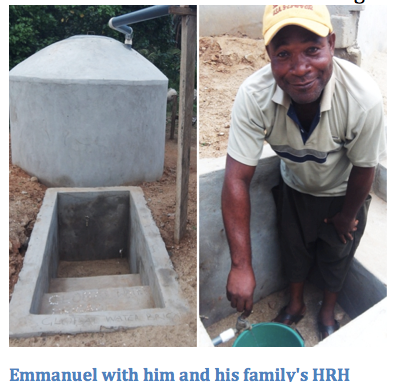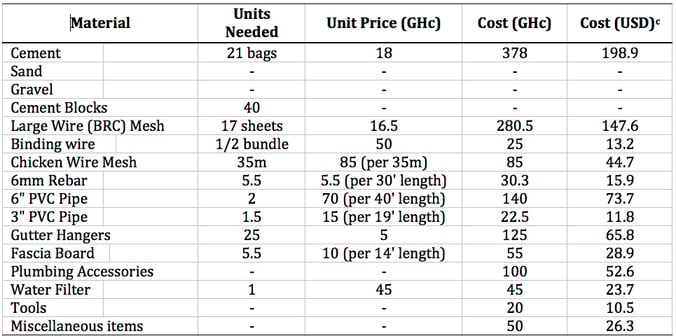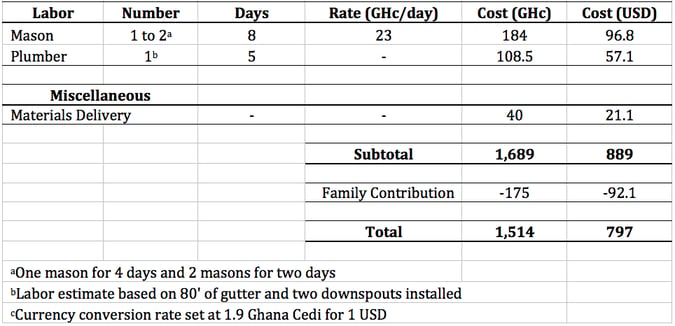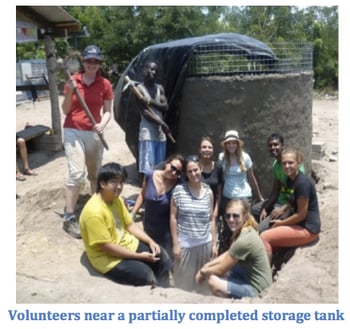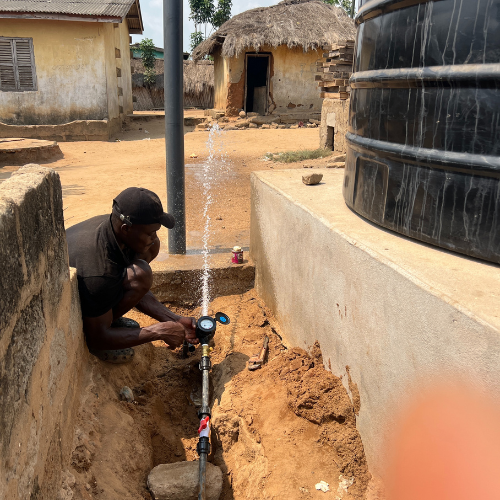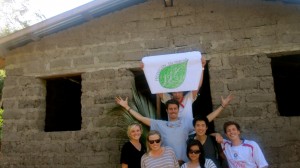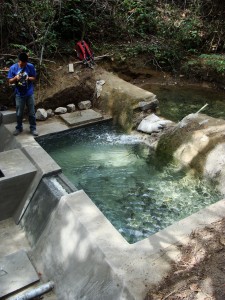Program History
Water Brigades Ghana utilizes rainwater harvesting as a water solution in communities. Rainwater harvesting in communities Water Brigades works with is the most practical solution for locations without access to ground or surface water. Surface water is 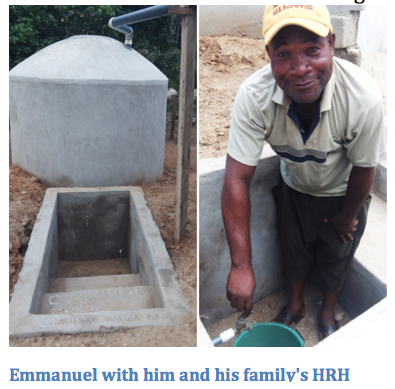 seasonal and the ground water cannot be utilized because of salinity with its close location to the ocean. Water Brigades Ghana has previously focused on two types of water solutions in rural Ghanaian communities: School Rainwater Harvesters (SRH) and Community-Wide Rainwater Harvesters (CWRH).
seasonal and the ground water cannot be utilized because of salinity with its close location to the ocean. Water Brigades Ghana has previously focused on two types of water solutions in rural Ghanaian communities: School Rainwater Harvesters (SRH) and Community-Wide Rainwater Harvesters (CWRH).
As Water Brigades grows we aim to provide a higher level of service, which means consistent clean water access throughout the year. SRH provide clean drinking water to students while in school, but cannot provide for clean water needs when students are outside of school. CWRH provide a centralized storage system to sell collected water during the rainy season and which has water delivered to it during the dry season. The CWRH is too expensive to scale to meet even the basic drinking water needs for all community members in the rainy season. During the dry season the CWRH’s operation is unreliable because the system depends on a single delivery tanker service, which is extremely inconsistent.
These systems can only provide water intermittently and neither can consistently provide for basic drinking water needs, forcing community members to rely on collecting unclean water or purchasing water when available.
New Model Overview
To increase the level of service and sustainability, Water Brigades in Ghana has changed the water solution offered in communities. Water Brigades will now work with families to build Household Rainwater Harvesters (HRH), which will provide water for drinking and cooking (consumption) throughout the entire year. Water Brigades will construct these systems incrementally for families in communities.
Household Rainwater Harvesters
A HRH has two components, a gutter system and storage tank. Gutters collect rainwater from a family’s roof into a ferrocement storage tank. Ferrocement storage tanks have been used in developing countries for over 30 years and are a reliable and affordable technology. Water Brigades will utilize families, volunteers, masons and plumbers to construct these systems, over the course of 5 to 6 days.
HRH size has been based off of a 7.5 L/capita-day consumption rate during the 3 to 4 month dry season. This quantity was determined using the World Health Organization’s Domestic Water Quantity, Service Level and Health paper (2003). A higher level of service will be available outside of the dry season, when the goal is to provide families access to 20L/capita-day (dependent on roof size), which will provide for consumption and basic hygiene needs.
Below is a chart showing the estimated expenditures for a generalized HRH for a family of 10. This HRH has a storage tank size of 9,900 L and will require 8 volunteers to construct. The total cost estimate is 1,514 GHc, or USD 797. Using this estimate (considering the family’s contribution, detailed later), providing an individual with sustainable clean water access costs USD 80.
Family Contribution
The family contribution is an important aspect of the model to secure households ownership and responsibility for their systems from a monetary contribution. The family contribution also consists of gathering or providing the following material: water, sand, gravel and cement blocks.
Water Brigades offers three tank sizes based on family size, which have three corresponding prices. For a family of 10, the contribution is 175 Ghana Cedi (~USD 92). This payment amount correlates to around 10% of the system cost, which is also around 10% of an average family’s annual income. Families will have the ability to incrementally save for these systems in community banks where Microfinance Brigades is also working.
Water Treatment & Education
The education component of Water Brigades will consist of household education and student education.
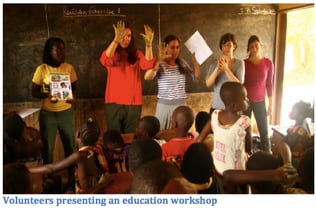 Household education will consist of two topics that volunteers will provide. The first topic will cover the HRH orientation, operation, and maintenance. The second topic will incorporate the water filter, installation, instruction and demonstration. The water filter is an essential component of the HRH, as it provides a family with the ability to consume clean water.
Household education will consist of two topics that volunteers will provide. The first topic will cover the HRH orientation, operation, and maintenance. The second topic will incorporate the water filter, installation, instruction and demonstration. The water filter is an essential component of the HRH, as it provides a family with the ability to consume clean water.
In addition to the family education, volunteers will also be responsible for organizing and presenting a specific education topic to students at the local school. These topics cover water education, hygiene and sanitation.
Brigade Itinerary
Below is a general outline (subject to change) of what the new 10-day Water Brigade in Ghana looks like:
Day 1: Arrival and Water Introduction
Volunteers will be greeted by Global Brigades staff at the airport. After traveling to the lodging facility, a Water Brigades Staff will host an introduction, which will cover the current project, the community, and the factors inhibiting the community’s access to clean water.
Day 2: Community and Project Introduction
Volunteers are first welcomed by the community at a community-wide gathering. Then volunteers will divide into small groups to meet with families and talk to them more in depth about their access to water, lives and unique needs and challenges. With more understanding and perspective from the community, volunteers will be introduced to the water solution you will build, Household Rainwater Harvesters.
Day 3-7: Project Implementation
Volunteers will work with families to construct their new water system. You will contribute to this project in a number of hands on ways: tying steel, mixing concrete and mortar, plastering, and other construction activities.
During day 7 of project implementation, volunteers will also present household education topics and an education workshop to students at the school.
Day 8: Closing Ceremony & Project Completion
After completion of the system the community and volunteers will have a community-wide gathering, celebrating the work completed.
Depending on the pace of the previous construction days this day may also allow volunteers to finish construction of the system.
Day 9: Tour Day
Volunteers will get to learn and experience more of Ghana during a trip to Kakum National Park and Cape Coast Castle.
Day 10: Departure
After a successful brigade, volunteers return home to share their experiences with their family, friends and donors.
Maintenance & Sustainability
Although the ferrocement tank technology is not prevalently used in the Central Region of Ghana, the elements of the tank are consistent with other common water storage tanks. A mason with experience building a tank to store water will have the ability to 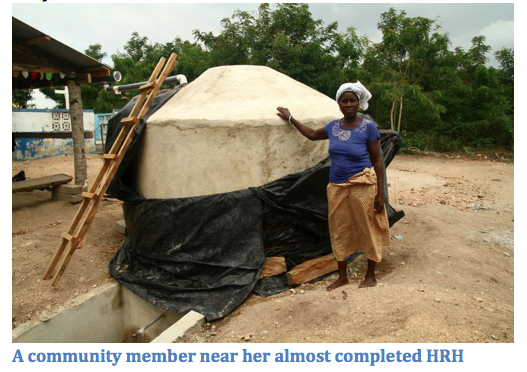 fix repairs such as cracks or leaks in a tank. In addition, Water Brigades uses commonly available plumbing and construction materials that can be purchased in local markets and used in repairing the systems.
fix repairs such as cracks or leaks in a tank. In addition, Water Brigades uses commonly available plumbing and construction materials that can be purchased in local markets and used in repairing the systems.
Water Brigades ensures sustainability by training and working with masons from the communities. Masons are skilled in making any future repairs to systems in their community, providing a sustainable method for families to maintain their systems into the future. Families are presented with the procedures and policies to follow regarding maintenance and repairs before construction begins so that they are prepared and informed from the beginning.
Beyond the brigade timeframe, the Water Brigades Team completes follow-up visits to families and systems, answering questions and providing recommendations and support. In addition, Water Brigades and Public Health Brigades are currently working on developing a Basic Sanitation Committee, similar to committees trained by Global Brigades Honduras. These committees will become leaders and valuable resources in their communities, advocating for increased sanitation and hygiene practices throughout the community.
Conclusions
Water Brigades Ghana’s Household Rainwater Harvesters can consistently provide water for consumption to a family through the entire year. The HRH system allows increased volunteer and family engagement during the implementation process and a more personal volunteer to family interaction. This new model for Water Brigades is financially feasible, volunteer engaging, allows incremental and complete community coverage, and is a direction Water Brigades Ghana is excited to continue.
If you or your chapter has more questions regarding the new model, please contact Frank Schalla at frank.schalla@globalbrigades.org.

